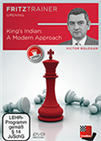A chess party in Amsterdam
The tenth edition of this classical tournament in Amsterdam's Cafe Batavia was extra strong, with all players rated above 2400 Elo. Although there were no GM norms this year (as compared to last year's remarkable two GM norms and one IM norm), the wildly entertaining games and the unique atmosphere made for a great event.

Cold enough to skate on the canals in Amsterdam! | Photo: Bas Beekhuizen
The most remarkable game of the tournament was played in the very first round. Being the lowest rated player in the tournament didn't prevent local chess artist Manuel Bosboom from beating top seed Ivan Sokolov with the black pieces in amazing style. This game was awarded the best game prize!
 Bologan: "If you study this DVD carefully and solve the interactive exercises you will also enrich your chess vocabulary, your King's Indian vocabulary, build up confidence in the King's Indian and your chess and win more games."
Bologan: "If you study this DVD carefully and solve the interactive exercises you will also enrich your chess vocabulary, your King's Indian vocabulary, build up confidence in the King's Indian and your chess and win more games."
Two veterans of the Amsterdam chess scene | Photos: Lennart Ootes
With good opening preparation and fast play Alexandr Fier convincingly took the sole lead with two out of two. In the third round, the coolest endgame of the tournament was played between, of course, Alexandr Fier and Manuel Bosboom. Just count the number of exchange sacrifices!
The positional exchange sacrifice is one of the most powerful and fascinating strategic weapons in chess. On this DVD Sergey Tiviakov explains why the positional exchange sacrifice is such a strong weapon and how to use it.
After five rounds, going into the rest day, the standings were:
1) Fier 4
2) Sokolov 3½
3) Bosboom 3
4-7) Kevlishvili, Nijboer, Zatonskih, Santos Ruiz 2½
8-10) Beerdsen, Kashlinskaya, Vrolijk 1½
So, it was time for Robby Kevlishvili to go "all-in" with the white pieces against the tournament leader.

An archetypal Batavia scene: Watching Kevlishvili vs Fier | Photo: Bas Beekhuizen
In the seventh round, there was a critical game which basically decided the tournament:

 Danish GM Jacob Aagaard introduces you to the secrets of the Nimzoindian Defence (1.d4 Nf6 2.c4 e6 3.Nc3 Bb4). In 15 lessons that last 4 hours and 4 minutes Aagaard shows you how you can successfully play this opening by understanding key ideas instead of memorizing long tedious variations.
Danish GM Jacob Aagaard introduces you to the secrets of the Nimzoindian Defence (1.d4 Nf6 2.c4 e6 3.Nc3 Bb4). In 15 lessons that last 4 hours and 4 minutes Aagaard shows you how you can successfully play this opening by understanding key ideas instead of memorizing long tedious variations.With this draw, the Brazilian Champion kept his half a point lead, which eventually was enough for the tournament victory. In the final two rounds, Ivan Sokolov faced the two women in the field, Anna Zatonskih and Alina Kashlinskaya, who were both having a tough tournament, but both games were drawn after a stubborn fight.
The third grandmaster, Friso Nijboer [photo: Lennart Ootes], no longer plays chess full-time, but enjoyed his participation and got back to 50% in the final hour of play.
After his very impressive unbeaten two out of three start against the three grandmasters, Manuel Bosboom started running out of steam and in fact finished with a disappointing zero for four against the four youngsters. This new generation — Thomas Beerdsen (19), Miguel Santos Ruiz (18), Robby Kevlishvili (16) and Liam Vrolijk (15) — played remarkably pragmatically. Likely influenced by the modern fast time controls and frequent double-rounds, the kids play fast and solid, but their play lacks some strategical depth every now and then.

15-year-old Liam Vrolijk an FM rated 2433 | Photo: Lennart Ootes
At the prizegiving, the dates for next year were announced: February 28th — March 10th, 2019.
Final standings
All games
Final standings (Blitz tournament)
All games (blitz tournament)
Links
























